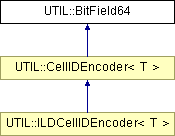A bit field of 64bits that allows convenient declaration and manipulation of sub fields of various widths. More...
#include <UTIL/BitField64.h>

Public Types | |
|
typedef std::map< std::string, unsigned int > | IndexMap |
Public Member Functions | |
| BitField64 (const std::string &initString) | |
| The c'tor takes an initialization string of the form: <fieldDesc>[,<fieldDesc>. | |
| lcio::long64 | getValue () const |
| Returns the current 64bit value. | |
| void | setValue (lcio::long64 value) |
| Set a new 64bit value. | |
| void | reset () |
| Reset - same as setValue(0) - useful if the same encoder is used for many objects. | |
| BitFieldValue & | operator[] (size_t theIndex) |
| Acces to field through index. | |
| const BitFieldValue & | operator[] (size_t theIndex) const |
| Const acces to field through index. | |
| unsigned | highestBit () const |
| Highest bit used in fields [0-63]. | |
| size_t | size () const |
| Number of values. | |
| size_t | index (const std::string &name) const |
| Index for field named 'name'. | |
| BitFieldValue & | operator[] (const std::string &name) |
| Access to field through name . | |
| const BitFieldValue & | operator[] (const std::string &name) const |
| Const Access to field through name . | |
| unsigned | lowWord () const |
| The low word, bits 0-31. | |
| unsigned | highWord () const |
| The high word, bits 32-63. | |
| std::string | fieldDescription () const |
| Return a valid description string of all fields. | |
| std::string | valueString () const |
| Return a string with a comma separated list of the current sub field values. | |
Protected Member Functions | |
| void | addField (const std::string &name, unsigned offset, int width) |
| Add an additional field to the list. | |
| void | init (const std::string &initString) |
| Decode the initialization string as described in the constructor. | |
| BitField64 () | |
| No default c'tor. | |
Protected Attributes | |
| lcio::long64 | _value |
| lcio::long64 | _joined |
Friends | |
| std::ostream & | operator<< (std::ostream &os, const BitField64 &b) |
A bit field of 64bits that allows convenient declaration and manipulation of sub fields of various widths.
Example:
BitField64 b("layer:7,system:-3,barrel:3,theta:32:11,phi:11" ) ;
b[ "layer" ] = 123 ;
b[ "system" ] = -4 ;
b[ "barrel" ] = 7 ;
b[ "theta" ] = 180 ;
b[ "phi" ] = 270 ;
...
int theta = b["theta"] ;
...
unsigned phiIndex = b.index(phi) ;
int phi = b[ phiIndex ] ;
| UTIL::BitField64::BitField64 | ( | const std::string & | initString | ) | [inline] |
The c'tor takes an initialization string of the form:
<fieldDesc>[,<fieldDesc>.
..]
fieldDesc = name:[start]:[-]length
where:
name: The name of the field
start: The start bit of the field. If omitted assumed to start immediately following previous field, or at the least significant bit if the first field.
length: The number of bits in the field. If preceeded by '-' the field is signed, otherwise unsigned.
Bit numbering is from the least significant bit (bit 0) to the most significant (bit 63).
Example: "layer:7,system:-3,barrel:3,theta:32:11,phi:11"
| void UTIL::BitField64::init | ( | const std::string & | initString | ) | [protected] |
Decode the initialization string as described in the constructor.
References addField().
 1.6.1
1.6.1